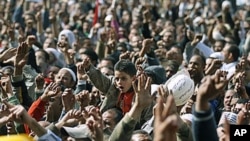U.S. President Barack Obama has once again called on Egyptian President Hosni Mubarak to begin now an orderly political transition process leading to free and fair elections. It remains to be seen what influence - if any - Washington has over developments in the Arab world in general, and in Egypt in particular.
Many analysts believe Washington's credibility with what is known as "the Arab street" - or Arab public opinion in the Middle East - is very low.
One of those is Aaron David Miller, a former senior State Department official, now with the Woodrow Wilson International Center for Scholars.
"We are bogged down in two wars, in Afghanistan and in Iraq," said Miller. "We are trying to manage, and we are doing so fairly competently, sanctions against Iran - but without much effect in terms of deterring the Iranians from acquiring a [nuclear] weapon. The Arab-Israeli peace process, even before this, was in a deep freeze. And I suspect we are neither feared, respected, nor admired in this region, as much as we need to be, given how important it is for our interests. So I think our street credit is very low. I think people say "no" to us without much cost or consequence and I think we are in for a very rocky period in the weeks ahead."
Miller said one has to be very concerned about the effect of current, and possibly future, anti-government protests in Arab countries.
"You are going to end up with governments that are much more responsive and reflective of public and popular opinion, which in turn may make them much more critical of American policies," said Miller.
Daniel Kurtzer, a former U.S. Ambassador to both Egypt and Israel, said most countries in the Middle East are potentially vulnerable to street demonstrations.
"There are a lot of economic issues in the region," said Kurtzer. "There is not a lot of political space for open political activity, so it's hard to predict what's next. But my guess is that every government in the region is trying to put their finger on the pulse of their own population and maybe some of them can get ahead of the curve and actually begin to solve some of these problems."
Many analysts, such as Fawaz Gerges with the London School of Economics, said in the long term, irrespective of U.S. influence or lack thereof, people in Arab countries in the Middle East will determine their own fate - as is the case in Egypt.
"The future of Egypt will be determined by Egyptians," said Gerges. "There is a new reality in politics in the Middle East. The new reality is people are becoming empowered, they realize that the oppressive status quo has done a great deal of damage to their society, to their reputation, to their economy. The United States has limited options, even though the United States can be a force for stability by trying to convince and nudge its allies - that is they must respect the new reality of politics in the Middle East."
Gerges said the new reality is all about pluralism. "It's about institution building. It's about bread and butter. It's about freedom. In the long term, I would say that America's strategic interests are served, will be served, by the new reality, in particular if the new awakening is consolidated in institutional building and pluralistic government."
In the final analysis, Aaron David Miller said let's not overstate American influence in the Arab world.
"Look, we have to get a grip and understand one thing - we don't manage history," said Miller. "Reinhold Niebuhr [American theologian] said you can't control and manage history. And we have to get used to that fact."
Describing the Middle East, Miller says "you have a broken, dysfunctional region that is going to take years to repair - and it cannot be repaired from the outside."
What Influence Does Washington Have in the Arab World?




